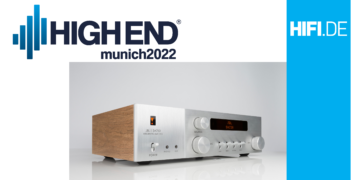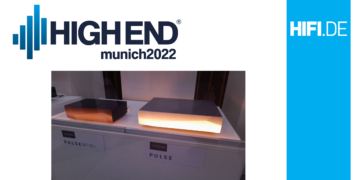| HIFI-FORUM » English » Stereo (Engl.) » 0.9V | |
|
|
||||
0.9V+A -A |
|||
| Autor |
| ||
|
Neutral
Stammgast |
#1
erstellt: 28. Jun 2006, 10:50

|
||
|
I measured the output voltage of my amplifier when playing classical music and was shocked at the findings.  I found the voltage at each terminal was varying between 0.1V and 0.9V only. (I had expected to see a voltage of around 20V at the peak.) It seems that a tiny dry-cell battery produces a higher voltage than a stereo amp  All my readings were taken with a borrowed digital multimeter. If anyone has done their own research, please let me know the findings. |
|||
|
audio_engr
Ist häufiger hier |
#2
erstellt: 28. Jun 2006, 20:39

|
||
|
The last time I did this was a couple of yrs back - music was Classical with a full-fledged orchestra, Tutti Orcherstal Sampler of Reference Recordings, Track 1 Dance of the Tumblers. At the heaviest cresendos, I was getting readings of 8-9V while soft passages were typically 200-700mV (0.2-0.7V). |
|||
|
|
|||
|
bombaywalla
Stammgast |
#3
erstellt: 28. Jun 2006, 21:01

|
||
music is a time-varying signal. the multimeter cannot measure a varying signal - it was not designed to. Thus, you are reading off the average output signal voltage. attach an oscilloscope to the output & take a look @ the signal. see any difference?  |
|||
|
Amp_Nut
Inventar |
#4
erstellt: 29. Jun 2006, 03:10

|
||
|
Bombaywalla is PERFECTLY correct.
Nah ! Connect a 1.5Volt Dry Cell Across the speaker terminal ( It WONT Harm the speakers... they can handle WAY more than that ) repeatedly, and check out the sound level from yr speakers  Cheers P.S: Which Meter are you using ? Is it set to AC Voltage ( Not DC voltage ? Most low cost meters are made for 50 Hz measurements, and their response rolls off rapidly, at higher freqs. Ofcourse the dynamic nature of the music signal is the main cause of the lower reading. PPS: If you have a Laptop, there are freeware programs that can enable it as an O'scope, signal generator, FFT analyser etc, without the need for any external hardware. Same software can ofcourse be loaded on a desktop, but its impractical to use it around... |
|||
|
Savyasaachi
Inventar |
#5
erstellt: 29. Jun 2006, 10:21

|
||
|
Hi .. please check if the voltage is DC or Ac.. if it is DC then its good that the output is low.. though in actuality the DC output has to be less than 20mV...or 0.02V A high DC is enough to melt the voice coil and blow ur speakers to hell.. That is waht happpens when amplifiers blow..full DC is deliverd to the load..aka ur speakers.. But since u guys mostly use passive speakers(not to mention commeercial amps with adequate protection) the capacitors in the crossover should prevent the DC from reaching the spekaers and give u enough time to turn it off.. |
|||
|
Savyasaachi
Inventar |
#6
erstellt: 29. Jun 2006, 10:25

|
||
i would advise that u rather not do that..though as i have explained u have proper circuitry for DC protection(relays that turn off when DC is detected above a certain limit) and the caps in series with the drivers..why try it.. as bombaywalla says, use a scope if u want to check the output of the amp. |
|||
|
ruesselschorf
Inventar |
#7
erstellt: 29. Jun 2006, 10:43

|
||
|
Hello, as a rule of thump, the AVERAGE power at normal listening levels is only 0.1 Watt, that's about 1 Volt ac into an 8 Ohms speaker. Only for very short peaks (bass drum beat) an amplifier will send pulses up to 40 Volt ac to the speaker. You can't measure those short pulses with a digital voltmeter, it reacts much to slow. Better is a (peak reading) VU-meter or an oszilloscope. Gruß, Helmut |
|||
|
Manek
Inventar |
#8
erstellt: 29. Jun 2006, 10:59

|
||
|
Hm.....the VU meter is not a bad idea. manek. |
|||
|
Neutral
Stammgast |
#9
erstellt: 30. Jun 2006, 09:57

|
||
|
I used the AC voltage function of a digital multimeter. Those who have access to oscilloscopes can post their findings. I don't have access to those equipments. Maybe, as you folks say, the digital multimeter is measuring the average signal rather than the instantaneous signal. Re making a computer into an oscilloscope, is that done with Cool Edit, sound forge, etc? But how can you tap a voltage from an amp? Wouldn't it be dangerous? |
|||
|
ruesselschorf
Inventar |
#10
erstellt: 30. Jun 2006, 10:58

|
||
|
Hello,
You won't hurt yourself, but you could easily ruin your amp or speakers. To make measurements that make sense you need a basic electronics background and some equipment like function generator, load resistors,o-scope.... What is your intention anyway? Helmut |
|||
|
Amp_Nut
Inventar |
#11
erstellt: 30. Jun 2006, 12:56

|
||
There are small software available on the net which will run on a Win platform. It uses the sound card inputs as the O'scope input and the sound card o/p as the Waveform / signal generator outputs. Hence measurements are restricted to freqs that the sound card will support. Most of such software is freeware. Google and see. A laptop ( on battery power ) is a better option to use, since besides the portability, it is not referenced to ground, or worse still to the local mains supply neutral or ( God Forbid) the Mains live.... I have experienced many PCs, where the chasis is live....  |
|||
|
Neutral
Stammgast |
#12
erstellt: 01. Jul 2006, 05:56

|
||
Hi Ruesselschorf, Nice to have you on the English forum too. I guess you're German? What you say ties in with my readings. Average signal strength varying between 0.1 to 0.9V of AC at a speaker avg impedance of 6 ohms. At peak of avg signal, P= V * V/R = .9 * .9/6 |
|||
|
Neutral
Stammgast |
#13
erstellt: 01. Jul 2006, 06:02

|
||
Hi Amp Nut, I will check out the software. I unfortunately never checked my desktop PC for live chassis etc. And now the multimeter is back in the US  I have noticed that software like Win ISD pro have signal generators. I guess they could also be used for testing of room modes at various frequencies. My room should have a peak around 57 Hz (though I never got down to measuring it). It's a 10h x 10b x 12l room. |
|||
|
Amp_Nut
Inventar |
#14
erstellt: 01. Jul 2006, 06:51

|
||
1. Crudest tester .... Use your finger !  2. You can also use a Mains tester scrwedriver. 3. Incidentally, El Cpeapo Digital Multimeters ( From China ofcourse ! ) are available at Lamington Road, Mumbai for abouit Rs 100. |
|||
|
Neutral
Stammgast |
#15
erstellt: 01. Jul 2006, 09:15

|
||
1.If I used my finger and it was live, I would have died long ago. My comp is fine that way. 2. No way a tester will measure a tiny voltage. 3. The multimeter I used was US and cost around 60$. A very accurate meter. No clue about Chinese stuff being good enough for finicky audio folks like us. |
|||
|
Monsterle
Inventar |
#16
erstellt: 01. Jul 2006, 09:37

|
||
|
Be careful if you intend to measure at the output of a bridged amp with an Oscilloscope. The reason is, that most scopes' housings (and therefore also the shields of their probes) are grounded which causes a shortcut when measuring at the two output poles. This may damage your amp. Regards, Monsterle |
|||
| |||
|
|
||||
| Das könnte Dich auch interessieren: |
|
Voltage stabilizer cheraz am 02.02.2004 – Letzte Antwort am 03.02.2004 – 8 Beiträge |
|
Voltage conversion mmx_2 am 25.12.2004 – Letzte Antwort am 28.12.2004 – 11 Beiträge |
|
Voltage Converter for nad320bee amplifier. Hemanth am 17.01.2005 – Letzte Antwort am 18.01.2005 – 2 Beiträge |
|
Piper at the Gates of Dawn! Voodoo_CHild am 08.03.2007 – Letzte Antwort am 16.03.2007 – 24 Beiträge |
|
A labour of Love Savyasaachi am 08.02.2006 – Letzte Antwort am 14.02.2006 – 11 Beiträge |
|
A Peculiar observation.more of a problem abhi.pani am 13.10.2006 – Letzte Antwort am 16.10.2006 – 28 Beiträge |
|
Voltage Converter 220V/50Hz to 120V/60Hz swamipr1977 am 25.04.2005 – Letzte Antwort am 15.06.2005 – 5 Beiträge |
|
Think i found a find! puchoo am 11.06.2007 – Letzte Antwort am 11.06.2007 – 4 Beiträge |
|
The importance of a good cdp not to mention recordings. benkenobi am 20.04.2005 – Letzte Antwort am 22.04.2005 – 20 Beiträge |
|
Good to have some basic tools lying around benkenobi am 15.08.2005 – Letzte Antwort am 18.08.2005 – 4 Beiträge |
Anzeige
Top Produkte in Stereo (Engl.)

Aktuelle Aktion
Top 10 Threads in Stereo (Engl.) der letzten 7 Tage

- Good speakers for old system
- Jamo Concert E750 and E770
- Replacing Stock Jumpers on NAD/Marantz
- FYI: Cadence latest price list
- One speaker "louder" than the other?
- TNT triple T loudspeaker cable
- Vincent SV 231
- Planar speakers
- Best Amp for Quad 11L? Nad vs Rotel vs Marantz vs CA
- Is Jamo E-series worth it?
Top 10 Threads in Stereo (Engl.) der letzten 50 Tage

- Good speakers for old system
- Jamo Concert E750 and E770
- Replacing Stock Jumpers on NAD/Marantz
- FYI: Cadence latest price list
- One speaker "louder" than the other?
- TNT triple T loudspeaker cable
- Vincent SV 231
- Planar speakers
- Best Amp for Quad 11L? Nad vs Rotel vs Marantz vs CA
- Is Jamo E-series worth it?
Top 10 Suchanfragen

Forumsstatistik

- Registrierte Mitglieder927.961 ( Heute: 7 )
- Neuestes MitgliedKVG-1969
- Gesamtzahl an Themen1.557.022
- Gesamtzahl an Beiträgen21.670.899














